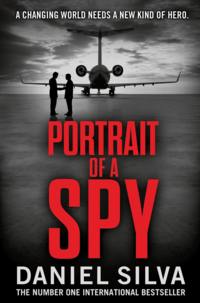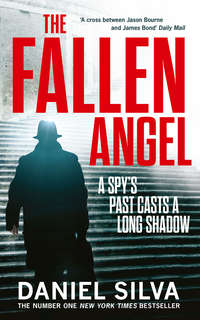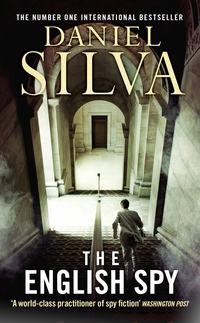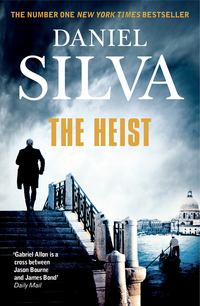
Полная версия
The Black Widow
He looked into the rearview mirror and waited for the eyes of the driver to meet his. The driver’s name was Sami Haddad. He was a Maronite, a former member of the Lebanese Forces Christian militia, and a longtime contract employee of the Office. He had the gentle forgiving eyes of a priest and the swollen hands of a prizefighter. He was old enough to remember when Beirut was the Paris of the Middle East—and old enough to have fought in the long civil war that had torn the country to pieces. There was nothing Sami Haddad didn’t know about Lebanon and its dangerous politics, and nothing he couldn’t lay his hands on in a hurry—weapons, boats, cars, drugs, girls. He had once procured a mountain lion on short notice because the target of an Office recruitment, an alcoholic prince from a Gulf Arab dynasty, admired predatory cats. His loyalty to the Office was beyond question. So were his instincts for trouble.
“Relax,” said Sami Haddad, finding Mikhail’s eyes in the mirror. “We’re not being followed.”
Mikhail peered over his shoulder at the lights of the traffic following them along the Corniche. Any one of the cars might have contained a team of killers or kidnappers from Hezbollah or one of the extreme jihadist organizations that had taken root in the Palestinian refugee camps of the south—organizations that made al-Qaeda seem like dowdy old Islamic moderates. It was his third visit to Beirut in the past year. Each time, he had entered the country with the same passport, protected by the same cover story. He was David Rostov, an itinerant businessman of Russian-Canadian descent who acquired illicit antiquities in the Middle East for a largely European clientele. Beirut was one of his favorite hunting grounds, for in Beirut anything was possible. He had once been offered a seven-foot Roman statue, remarkably intact, of a wounded Amazon. The cost of the piece was $2 million, shipping included. Over endless cups of sweet Turkish coffee, he convinced the seller, a prominent dealer from a well-known family, to drop his price by half a million. And then he walked away, earning for himself the reputation of both a shrewd negotiator and a tough customer, which was a good reputation to have in a place like Beirut.
He checked the time on his Samsung mobile. Sami Haddad noticed. Sami noticed everything.
“What time is he expecting you?”
“Ten o’clock.”
“Late.”
“Money never sleeps, Sami.”
“Tell me about it.”
“Shall we go straight to the hotel, or do you want to take a drive first?”
“Your call.”
“Let’s go to the hotel.”
“Let’s take a drive.”
“No problem.”
Sami Haddad turned off the Corniche into a street lined with colonial French buildings. Mikhail knew it well. Twelve years earlier, while serving in the Sayeret Matkal special forces, he had killed a terrorist from Hezbollah as he lay sleeping in the bed of a safe house. To be a member of such an elite unit was the dream of every Israeli boy, and it was a particularly noteworthy achievement for a boy from Moscow. A boy who had to fight every day of his life because his ancestors happened to be Jewish. A boy whose father, an important Soviet academic, had been locked away in a psychiatric hospital because he dared to question the wisdom of the Party. The boy had arrived in Israel at the age of sixteen. He had learned to speak Hebrew in a month and within a year had lost all traces of a Russian accent. He was like the millions who had come before him, the early Zionist pioneers who had fled to Palestine to escape the persecution and pogroms of Eastern Europe, the human wrecks who came spilling out of the death camps after the war. He had shed the baggage and the weakness of his past. He was a new person, a new Jew. He was an Israeli.
“We’re still clean,” said Sami Haddad.
“Then what are you waiting for?” replied Mikhail.
Sami wound his way back to the Corniche and headed to the marina. Rising above it were the twin glass-and-steel towers of the Four Seasons Hotel. Sami guided the car into the drive and looked into the mirror for instructions.
“Call me when he arrives,” said Mikhail. “Let me know whether he has a friend.”
“He never goes anywhere without a friend.”
Mikhail collected his briefcase and overnight bag from the opposite seat and opened the door.
“Be careful in there,” said Sami Haddad. “Don’t talk to strangers.”
Mikhail climbed out and, whistling tunelessly, breezed past the valets into the lobby. A dark-suited security man eyed him warily but allowed him to enter without a search. He crossed a thick carpet that swallowed his footfalls and presented himself at the imposing reception desk. Standing behind it, illuminated by a cone of overhead light, was a pretty black-haired woman of twenty-five. Mikhail knew that the woman was a Palestinian and that her father, a fighter from the old days, had fled Lebanon with Arafat in 1982, long before she was born. Several other employees of the hotel also had troubling connections. Two members of Hezbollah worked in the kitchen, and there were several known jihadis in housekeeping. Mikhail reckoned that approximately ten percent of the staff would have killed him if informed of his true identity and occupation.
He smiled at the woman, and the woman smiled coolly in return.
“Good evening, Mr. Rostov. So good to see you again.” Her painted nails clattered on a keyboard while Mikhail grew light-headed from the stench of overripe azaleas. “We have you for just one night.”
“A pity,” said Mikhail with another smile.
“Do you require assistance with your luggage?”
“I can manage.”
“We’ve upgraded you to a deluxe sea-view room. It’s on the fourteenth floor.” She handed him his packet of room keys and gestured toward the elevators like a flight attendant pointing out the location of the emergency exits. “Welcome back.”
Mikhail carried his bag and briefcase into the elevator foyer. An empty carriage waited, its doors open. He stepped inside and, grateful for the solitude, pressed the call button for the fourteenth floor. But as the doors were closing, a hand poked through the breach and a man entered. He was thickset, with a heavy ridge over his brow and a jawbone built to take a punch. His eyes met Mikhail’s briefly in the reflection of the doors. A nod was exchanged, but no words passed between them. The man pressed the button for the twentieth floor, almost as an afterthought, and picked at his thumbnail as the carriage rose. Mikhail pretended to check his e-mail on his mobile and while doing so surreptitiously snapped the blunt-headed man’s photograph. He forwarded the photo to King Saul Boulevard, the location of the Office’s anonymous Tel Aviv headquarters, while walking along the corridor to his room. A glance around the door frame revealed no evidence of tampering. He swiped his card key and, bracing himself for attack, entered.
The sound of Vivaldi greeted him—a favorite of arms smugglers, heroin dealers, and terrorists the world over, he thought as he switched off the radio. The bed had already been turned down, a chocolate lay on the pillow. He went to the window and saw the roof of Sami Haddad’s car parked along the Corniche. Beyond was the marina, and beyond the marina the blackness of the Mediterranean. Somewhere out there was his back door. He was no longer allowed to come to Beirut without an offshore escape hatch. The next chief had plans for him—or so he had heard through the Office grapevine. For a secure institution, it was a notoriously gossipy place.
Just then, Mikhail’s mobile blossomed with light. It was a message from King Saul Boulevard stating that the computers could not identify the man who had joined him in the elevator. It advised him to proceed with caution, whatever that meant. He drew the blackout shade and the curtains and switched off the room lights one by one until the darkness was absolute. Then he sat at the foot of the bed, his gaze focused on the thin strip of light at the bottom of the door, and waited for the phone to ring.

It was not unusual for the source to be late. He was, as he reminded Mikhail at every opportunity, a very busy man. Therefore, it was no surprise that ten o’clock came and went with no call from Sami Haddad. Finally, at quarter past, the mobile flared.
“He’s entering the lobby. He has two friends, both armed.”
Mikhail killed the call and remained seated for an additional ten minutes. Then, gun in hand, he moved to the entrance hall and placed his ear against the door. Hearing nothing outside, he returned the gun to the small of his back and stepped into the corridor, which was deserted except for a single male member of the housekeeping staff. Upstairs, the roof bar was the usual scene—rich Lebanese, Emiratis in their flowing white kanduras, Chinese businessmen flushed with drink, drug dealers, whores, gamblers, adventure seekers, fools. The sea wind toyed with the hair of the women and made wavelets in the pool. The throbbing music, spun by a professional DJ, was a sonic crime against humanity.
Mikhail made his way to the farthest corner of the rooftop, where Clovis Mansour, scion of the Mansour antiquities-dealing dynasty, sat alone on a white couch facing the Mediterranean. He was posed as if for a magazine shoot, with a glass of champagne in one hand and a cigarette smoldering in the other. He wore a dark Italian suit and a white open-neck shirt that was handmade for him by his man in London. His gold wristwatch was the size of a sundial. His cologne hung around him like a cloak.
“You’re late, habibi,” he said as Mikhail lowered himself onto the couch opposite. “I was about to leave.”
“No, you weren’t.”
Mikhail surveyed the interior of the bar. Mansour’s two bodyguards were picking at a bowl of pistachios at an adjacent table. The man from the elevator was leaning against the balustrade. He was pretending to admire the view of the sea while holding a mobile phone to his ear.
“Know him?” asked Mikhail.
“Never seen him before. Drink?”
“No, thanks.”
“It’s better if you drink.”
Mansour flagged down a passing waiter and ordered a second glass of champagne. Mikhail drew a buff-colored envelope from his coat pocket and placed it on the low table.
“What’s that?” asked Mansour.
“A token of our esteem.”
“Money?”
Mikhail nodded.
“I don’t work for you because I need the money, habibi. After all, I have plenty of money. I work for you because I want to stay in business.”
“My superiors prefer it if money changes hands.”
“Your superiors are cheap blackmailers.”
“I’d look inside the envelope before calling them cheap.”
Mansour did. He raised an eyebrow and slipped the envelope into the breast pocket of his suit jacket.
“What have you got for me, Clovis?”
“Paris,” said the antiquities dealer.
“What about Paris?”
“I know who did it.”
“How?”
“I can’t say for certain,” said Mansour, “but it’s possible I helped him pay for it.”
4
BEIRUT—TEL AVIV
IT WAS HALF PAST TWO in the morning by the time Mikhail finally returned to his room. He saw no evidence to suggest it had been disturbed in his absence; even the little foiled chocolate lay at precisely the same angle atop his pillow. After sniffing it for traces of arsenic, he nibbled at a corner thoughtfully. Then, in an uncharacteristic fit of nerves, he hauled every piece of furniture that wasn’t bolted down into the entrance hall and piled it against the door. His barricade complete, he opened the curtains and the blackout shade and searched for his bolt-hole among the shipping lights in the Mediterranean. Instantly, he reproached himself for entertaining such a thought. The escape hatch was to be utilized only in cases of extreme emergency. Possession of a piece of intelligence did not fall into that category, even if the piece of intelligence had the potential to prevent another catastrophe like Paris.
They call him Saladin …
Mikhail stretched out on the bed, his back propped against the headboard, the gun at his side, and stared at the shadowy mass of his fortifications. It was, he thought, a truly undignified sight. He switched on the television and surfed the airwaves of a Middle East gone mad until boredom drove him toward the doorstep of sleep. To keep himself alert he guzzled a cola from the fridge bar and thought about a woman he had foolishly let slip through his fingers. She was a beautiful American of flawless Protestant pedigree who had worked for the CIA and, occasionally, for the Office. She was living in New York now, where she oversaw a special collection of paintings at the Museum of Modern Art. He’d heard she was seeing a man quite seriously, a bond trader, of all things. He contemplated calling her, just to hear the sound of her voice, but decided it would be unwise. Like Russia, she was lost to him.
What’s his real name, Clovis?
I’m not sure he ever had one.
Where’s he from?
He might have been from Iraq once, but now he’s a son of the caliphate …
Finally, the sky beyond Mikhail’s window turned blue-black with the coming dawn. He put his room in order and thirty minutes later slumped bleary-eyed into the back of Sami Haddad’s car.
“How did it go?” asked the Lebanese.
“Total waste of time,” replied Mikhail through an elaborate yawn.
“Where now?”
“Tel Aviv.”
“It’s not such an easy drive, my friend.”
“Then perhaps you should take me to the airport instead.”
His flight was at half past eight. He sailed through passport control as a smiling, somewhat drowsy Canadian and settled into his first-class seat aboard a Middle East Airlines jet bound for Rome. To shield himself from his neighbor, a Turkish salesman of disreputable appearance, he pretended to read the morning papers. In reality, he was considering all the possible reasons why an aircraft operated by the government of Lebanon might fail to reach its destination safely. For once, he thought glumly, his death would have consequences, for the intelligence would die with him.
How much money are we talking about, Clovis?
Four million, maybe five.
Which is it?
Closer to five …
The plane landed in Rome without incident, though it took Mikhail the better part of two hours to clear the organized stampede that was Fiumicino’s passport control. His stay in Italy was brief, long enough for him to switch identities and board another airplane, an El Al flight bound for Tel Aviv. An Office car waited at Ben Gurion; it whisked him north to King Saul Boulevard. The building at the western end of the street was, like Paul Rousseau’s outpost on the rue de Grenelle, a lie in plain sight. No emblem hung over its entrance, no brass lettering proclaimed the identity of its occupant. In fact, there was nothing at all to suggest it was the headquarters of one of the world’s most feared and respected intelligence services. A closer inspection of the structure, however, would have revealed the existence of a building within a building, one with its own power supply, its own water and sewer lines, and its own secure communications system. Employees carried two keys. One opened an unmarked door in the lobby; the other operated the lift. Those who committed the unpardonable sin of losing one or both of their keys were banished to the Judean Wilderness, never to be seen or heard from again.
Like most field agents, Mikhail entered the building through the underground parking garage and then made his way upward to the executive floor. Because the hour was late—the security cameras recorded the time as half past nine—the corridor was as quiet as a school that had been emptied of children. From the half-open door at the end of the hall stretched a slender rhombus of light. Mikhail knocked softly and, hearing no reply, entered. Stuffed into an executive leather chair behind a desk of smoked glass was Uzi Navot, the soon-to-be former chief of the Office. He was frowning at an open file as though it were a bill he could not afford to pay. At his elbow was an open box of Viennese butter cookies. Only two remained, not a good sign.
At length, Navot looked up and with a dismissive movement of his hand instructed Mikhail to sit. He wore a striped dress shirt that had been cut for a thinner man and a pair of the rimless spectacles beloved by German intellectuals and Swiss bankers. His hair, once strawberry blond, was gray stubble; his blue eyes were bloodshot. He rolled up his shirtsleeves, exposing his massive forearms, and contemplated Mikhail for a long moment with thinly veiled hostility. It wasn’t the reception Mikhail had expected, but then one never knew quite what to expect when one encountered Uzi Navot these days. There were rumors his successor intended to keep him on in some capacity—blasphemy in a service that regarded regular turnover at the top almost as a matter of religious doctrine—but officially his future was unclear.
“Any problems on the way out of Beirut?” Navot asked at last, as though the question had occurred to him suddenly.
“None,” answered Mikhail.
Navot snared a stray cookie crumb with the tip of a thick forefinger. “Surveillance?”
“Nothing we could see.”
“And the man who rode the hotel elevator with you? Did you ever see him again?”
“At the roof bar.”
“Anything suspicious?”
“Everyone in Beirut looks suspicious. That’s why it’s Beirut.”
Navot flicked the cookie crumb onto the plate. Then he removed a photograph from the file and dealt it across the desktop toward Mikhail. It showed a man sitting in the front seat of a luxury automobile, at the edge of a seaside boulevard. The windows of the car were shattered. The man was a bloody tattered mess, and quite obviously dead.
“Recognize him?” asked Navot.
Mikhail squinted in concentration.
“Look carefully at the car.”
Mikhail did. And then he understood. The dead man was Sami Haddad.
“When did they get him?”
“Not long after he dropped you at the airport. And they were just getting started.”
Navot spun another photo across the desk, a ruined building on an elegant street in downtown Beirut. It was Gallerie Mansour on the rue Madame Curie. Limbs and heads littered the pavement. For once the carnage wasn’t human. It was Clovis Mansour’s magnificent professional inventory.
“I was hoping,” Navot resumed after a moment, “that my last days as chief would pass without incident. Instead, I have to deal with the loss of our best contract employee in Beirut and an asset we spent a great deal of time and effort recruiting.”
“Better than a dead field agent.”
“I’ll be the judge of that.” Navot accepted the two photographs and returned them to the file. “What did Mansour have for you?”
“The man who was behind Paris.”
“Who is he?”
“They call him Saladin.”
“Saladin? Well,” Navot said, closing the file, “at least that’s a start.”

Navot remained in his office long after Mikhail had taken his leave. The desk was empty except for his leather-bound executive notepad, on which he had scrawled a single word. Saladin … Only a man of great self-esteem would grant himself a code name like that, only a man of great ambition. The real Saladin had united the Muslim world under the Ayyubid dynasty and recaptured Jerusalem from the Crusaders. Perhaps this new Saladin was similarly inclined. For his coming-out party he had flattened a Jewish target in the middle of Paris, thus attacking two countries, two civilizations, at the same time. Surely, thought Navot, the success of the attack had only whetted his lust for infidel blood. It was only a matter of time before he struck again.
For the moment, Saladin was a French problem. But the fact that four Israeli citizens had perished in the attack gave Navot standing in Paris. So, too, did the name that Clovis Mansour had whispered into Mikhail’s ear in Beirut. In fact, with a bit of skilled salesmanship, the name alone might be enough to secure the Office a seat at the operational table. Navot was confident in his powers of persuasion. A former field agent and recruiter of spies, he had the ability to spin straw into gold. All he needed was someone to look after the Office’s interest in any joint Franco-Israeli undertaking. He had but one candidate in mind, a legendary field agent who had been running operations on French soil since he was a boy of twenty-two. What’s more, the operative in question had known Hannah Weinberg personally. Unfortunately, the prime minister had other plans for him.
Navot checked the time; it was ten fifteen. He reached for his phone and dialed Travel.
“I need to fly to Paris tomorrow morning.”
“The six o’clock or the nine?”
“The six,” said Navot despondently.
“When are you coming back?”
“Tomorrow night.”
“Done.”
Navot rang off and then placed a final call. The question he posed was one he had asked many times before.
“How long before he’s finished?”
“He’s close.”
“How close?”
“Maybe tonight, tomorrow at the latest.”
Navot replaced the receiver and allowed his gaze to wander the spacious office that soon would no longer be his.
Tomorrow at the latest …
Maybe, he thought, or maybe not.
5
ISRAEL MUSEUM, JERUSALEM
IN THE FAR CORNER OF the conservation lab, a black curtain stretched from the white ceiling to the white floor. Behind it was a matching pair of oaken Italian easels, two halogen lamps, a Nikon camera mounted atop a tripod, a palette, a tiny bale of cotton wool, an ancient CD player smudged with several different colors of paint, and a trolley laden with pigments, medium, solvents, wooden dowels, and several Winsor & Newton Series 7 sable-hair paintbrushes. For the better part of the past four months, the restorer had labored there alone, sometimes late at night, sometimes long before dawn. He wore no museum credentials, for his true place of employment was elsewhere. The staff conservators had been advised not to mention his presence or even to speak his name. Nor were they to discuss the large painting, an Italian Old Master altarpiece, propped upon his easels. The painting, like the restorer, had a dangerous and tragic past.
He was below average in height—five foot eight, perhaps, no more—and slender of build. His face was high at the forehead and narrow at the chin, with wide prominent cheekbones and a long, bony nose that looked as though it had been carved from wood. The dark hair was cropped short and stained with gray at the temples, the eyes were an unnatural shade of green. His age was one of the most closely guarded secrets in Israel. Not long ago, when his obituary appeared in newspapers around the world, no verifiable date of birth ever found its way into print. The reports of his death had been part of an elaborate operation to deceive his enemies in Moscow and Tehran. They had believed the stories to be true, a miscalculation that allowed the restorer to take vengeance against them. Not long after his return to Jerusalem, his wife gave birth to a set of twins, a girl named Irene after his mother, and a son called Raphael. They were now—mother, daughter, son—three of the most closely guarded people in the State of Israel. So, too, was the restorer. He came and went in an armored American-made SUV, accompanied by a bodyguard, a fawn-eyed killer of twenty-five, who sat outside the door of the conservation lab whenever he was present.






